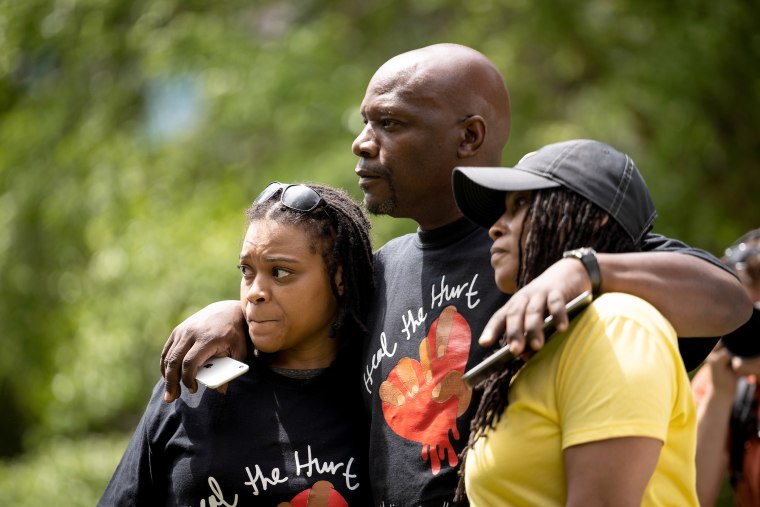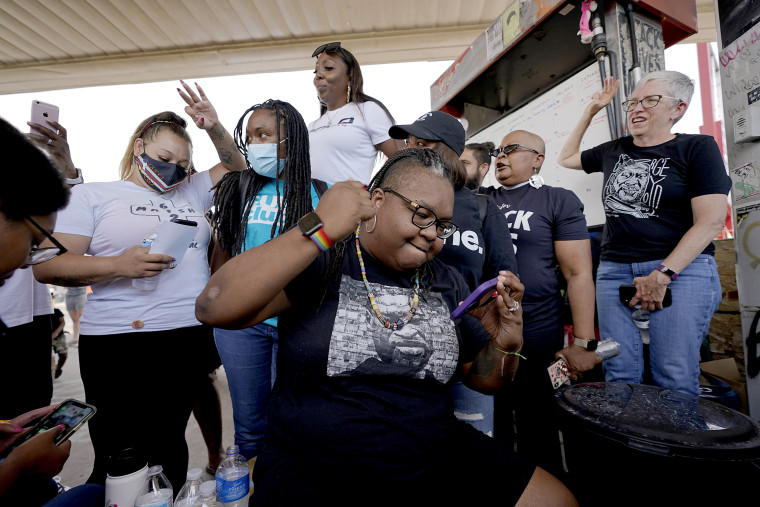MINNEAPOLIS — The 22 and a half-year sentence Derek Chauvin, the former Minneapolis police officer convicted of murdering George Floyd, received Friday fell below the 30 years prosecutors had sought for his crime, but it may still provide some closure.
"For once, a police officer who wrongly took the life of a Black man was held to account," Floyd family attorney Benjamin Crump said in a joint statement with the family. "While this shouldn't be exceptional, tragically it is."
The statement added, "This historic sentence brings the Floyd family and our nation one step closer to healing by delivering closure and accountability."
Hennepin County Court Judge Peter Cahill sentenced Chauvin about two months after he was convicted of second- and third-degree murder and second-degree manslaughter. He still faces federal charges of violating Floyd's civil rights.
At a news conference after the hearing, Crump thanked "millions of Americans" for raising their voices about police accountability and calling for justice for Floyd.
"We can breathe just a little easier today, and we thank you for that," Crump said.

"Federal charges are still pending," Crump said. "It is still attainable to get maximum accountability for George Floyd."
Terrence Floyd said the months of nationwide protests that erupted after his brother's death brought about change.
"The way we got here is because of your fight and our fight together," he said at the news conference. "You hit the streets, and we're thankful for y'all."
Another of Floyd's brothers, Philonise Floyd, said, "I begged for justice for my brother, some type of accountability."
"We're still fighting," he said. "That's something I can't stop."
George Floyd's youngest brother, Rodney Floyd, called the sentence "a slap on the wrist."
Crump and the Rev. Al Sharpton, leader of the National Action Network and an MSNBC host, urged Congress to pass the George Floyd Justice in Policing Act.
"We got more than we thought only because we have been disappointed many times before," Sharpton said. The sentence, he said, "is longer than we've ever gotten but shorter than we've gotten in the past."
Tara Brown, Floyd's cousin, also implored lawmakers to pass meaningful police reform legislation.
"We are keeping active and we want to make sure that you stay in the fight," she said. "Please keep fighting."
In an appearance on MSNBC, Cedric Alexander, the former president of the National Organization of Black Law Enforcement Executives, called the verdict "closure to that case."
Alpha Wallace, 62, a resident of Cumming, Georgia, who was visiting Minneapolis this week with friends, said they made a collective decision to stop at the Hennepin County Government Center to hear Chauvin's sentence and show their support for Floyd's family.
"It could happen anywhere," she said. "And it has."
Wallace said she is hopeful Chauvin's sentence will serve as a deterrent for police misconduct and that it leads to police accountability.
"Hopefully, it will continue that if someone is wrongfully killed by a police officer, the officer won't get away with it," she said.
Wallace was among dozens of people who gathered outside the courthouse awaiting the sentencing. But there was less celebration when the decision came than there had been in April when Chauvin's conviction was announced.
Many said they weren't fully satisfied with the verdict and believed it should have been stiffer.
"I just wanted him to get enough time so he could never get out," said Carl Cage, 66, a resident of St. Paul, Minnesota.
He believes Cahill missed an opportunity to make a statement.
Floyd, a Black man, was handcuffed facedown as Chauvin, who is white, knelt on his neck for 9½ minutes May 25, 2020, outside Cup Foods convenience store, where a store clerk suspected Floyd had tried to pass a fake $20 bill.
Floyd said multiple times that he couldn't breathe — pleas Chauvin ignored. Minneapolis police initially said in a statement that Floyd died after he "appeared to be suffering medical distress." The statement did not mention that Floyd had been restrained on the pavement.

A cellphone video posted to Facebook by bystander Darnella Frazier, who was 17 at the time, was widely viewed and shaped much of the public's understanding of Floyd's arrest and final moments. Chauvin and three other officers who were at the scene were fired the day after Floyd's death. Frazier won a Pulitzer Prize Special Citation this month for the footage.
The case has been closely watched, including by police officers.
Branville Bard Jr., the police commissioner in Cambridge, Massachusetts, said he expected Chauvin to get a longer sentence because his killing of Floyd was "such an egregious breach of trust."
But Bard said the sentence would have an impact on police officers by signaling that "jail time could be the cost you pay for failing the oath you took to protect."
That could have a positive effect, making officers "less likely to violate the public’s trust," he said.
Bard said he planned before the end of Friday to send a message to all members of his department "asking them to reflect on the sentence and how it just reinforced the need to maintain that professionalism that we take pride in."
An officer with the Metropolitan Police Department in Washington, D.C., said the sentence would have a limited effect on street-level officers because they saw what Chauvin did as far outside the bounds of normal police behavior and nothing they'd do themselves.
"I don't know a single officer who thought Derek Chauvin was innocent," the D.C. officer said.
But the officer, who spoke on condition of anonymity, said many rank-and-file officers are more concerned with the pending trials of three less experienced officers, including two rookies, who have been charged with aiding and abetting second-degree murder and aiding and abetting second-degree manslaughter for failing to stop Chauvin.
Convictions of those younger officers could prompt many officers to quit and dissuade many potential police recruits from joining the force, he said.
"If they are found guilty, I really worry about what's going to happen in terms of policing," the D.C. officer said. "We already have so few people who want to do this job, and if we come to the point where rookies end up with criminal convictions and prison sentences, I just don't know what's going to happen to the profession."
Meanwhile, Diane Goldstein, a retired lieutenant with the Redondo Beach Police Department in California and the executive director of the Law Enforcement Action Partnership, a nonprofit organization that advocates for improving public trust of police, said the sentence will resonate.
"I think the sentence sent a message to law enforcement that they will be held accountable for murders like this," she said. “It will have a deterrence value on law enforcement. I think cops will think about it."
"We have an obligation to make sure this doesn’t happen again," she said, "and if it does, that officer will be held accountable for their actions."
Janelle Griffith reported from Minneapolis. Dennis Romero reported from San Diego. Jon Schuppe reported from New York.

